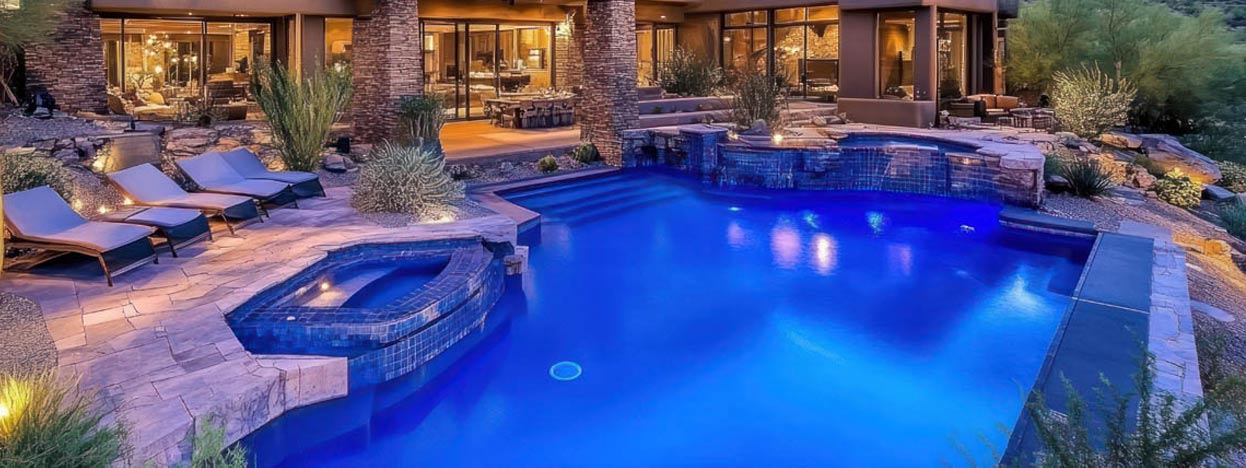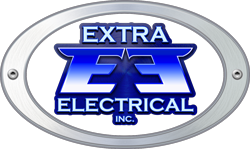- 8550 N 91st Ave building C Unit # 31 Peoria, AZ 85345
- info@extraelectrical.com
- Pool and Spa Automation Systems
- Pool and Spa Electrical Renovations
- Pool and Spa Electrical Inspections
- Pool and Spa Wiring Repairs
- Pool and Spa Electrical Systems Installation
- Pool and Spa Breaker Services
- Pool and Spa Lighting Repair
- Pool and Spa Electrical Panel Repairs
- Pool and Spa Lighting Installation
- Pool and Spa Electrical Systems Repair
Working Hours:
Monday - Saturday
8:00 AM - 5:00 PM
Get In Touch:

Pool and Spa Lighting Repair
Expert Pool & Spa Lighting Repairs in Phoenix and Maricopa County
Dim, flickering, or non-working pool and spa lights aren’t just an inconvenience—they can be a serious safety hazard. Whether it’s a burnt-out bulb, water intrusion, a faulty GFCI, or corroded wiring, lighting issues should be addressed quickly and correctly. At Extra Electrical Inc., we provide fast, code-compliant lighting repairs that keep your pool and spa safe, functional, and beautiful.
“Pool lights are exposed to harsh conditions—water, chemicals, heat. We repair them with safety and durability in mind so you can enjoy your space worry-free.”
— David Gomez, Owner, Extra Electrical Inc.
Why Lighting Repair Matters for Pool System Health
Lighting systems installed in and around water demand flawless insulation, wiring, and grounding. Even minor failures can lead to voltage leaks, shock risks, and equipment damage. Addressing lighting issues early helps maintain overall system safety, extends the lifespan of fixtures and power circuits, and ensures full compliance with NEC and local pool codes.
Reliable Lighting Repairs for Pools & Spas Across Phoenix
Extra Electrical Inc. specializes in troubleshooting and repairing pool and spa lighting for both residential and commercial properties. We handle LED and halogen fixtures, light housing leaks, transformer issues, GFCI faults, and automation malfunctions. Whether your system was installed 20 years ago or just last season, we’ll restore it to proper working order.
Serving Phoenix, Scottsdale, Chandler, Mesa, and the greater Maricopa County area, we bring extensive experience and a commitment to safety. We work efficiently to minimize downtime, keep your pool or spa operational, and ensure every repair meets today’s electrical standards.
Going the Extra Mile for Every Repair
Why Phoenix Trusts Extra Electrical for Pool & Spa Lighting Repairs
We don’t patch problems—we solve them. “Going the Extra Mile” means we fully inspect the wiring, replace failing components with long-lasting materials, and make sure your lighting works exactly as it should—day or night, season after season.
Why Choose Extra Electrical Inc.
- Licensed, bonded, and insured electricians
- Repairs for LED, halogen, and color-changing pool lights
- Fast diagnostics for leaks, shorts, and voltage faults
- Safe, code-compliant repair methods near water
- Full service throughout Phoenix and Maricopa County
- Clear pricing and honest recommendations
- Minimal disruption with clean, professional service
- Trusted by homeowners and pool service pros
Pool & Spa Lighting Repair FAQs
What causes pool lights to stop working?
Common issues include burnt-out bulbs, water infiltration in the fixture, corroded wiring, tripped GFCI outlets, or faulty transformers.
Is it safe to swim with a broken pool light?
No. Never swim if a pool light is malfunctioning or flickering. Call a licensed electrician to inspect and repair the issue first.
Can you repair lighting without draining the pool?
In most cases, yes. We use specialized tools and techniques to access and repair lights without full drainage, depending on the fixture type and issue.
Do you replace lights with LED options?
Absolutely. If desired, we can upgrade your lighting to energy-efficient LED systems during the repair process for better performance and longevity.



